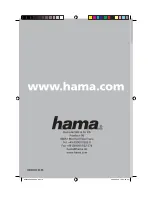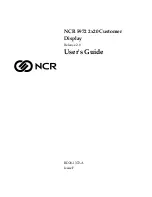
Components identified by mark have special characteristics important for safety.
When replacing any of these components, use only manufacture's specified parts.
Important Safety Notice
Notes:
1. Resistor
All resistors are cabon 1/4W resistor, unless marked as follows:
Unit of resistance is OHM [
W
] (K=1,000, M=1,000,000).
: Nonflammable
: Metal Oxide
: Solid
: Metal Film
: Wire Wound
: Fuse:
2. Capacitor
All capacitors are ceramic 50V capacitor, unless marked as follows:
Unit of capacitance is
m
F, unless otherwise noted.
: Temperature Compensation
: Electrolytic
: Polyester
: Bipolar
: Metalized Polyester
: Dipped Tantalum
: Polypropylene
: Z-Type
3. Coil
Unit of inductance is
m
F, unless otherwise noted.
4. Test Point
: Test Point position
5. Earth Symbol
: Chassis Earth (Cold)
: Line Earth (Hot)
6. Voltage Measurement
Voltage is measured by a DC voltmeter.
Conditions of the measurement are the following:
Power Source ................................................... 50/60Hz
Receiving Signal ............................................... Colour Bar signal (RF)
All customer's controls ...................................... Maximum positions
7. Number in red circle indicates waveform nember.
(See waveform pattern table.)
8. When arrow mark ( ) is found, connection is easily found from the direction of arrow
9. Indicates the major signal flow.
: Video
Audio
10. This schematic diagram is the latest at the time of printing and subject to change without
notice.
+
-
M
m
T
Z
NP
Remarks:
1. The Power Circuit contains a circuit area which uses a separate power supply to isolate the
earth connection.
The circuit is defined by HOT and COLD indications in the schematic diagram. Take the
follwing precautions.
All circuits, except the Power Circuit, are cold.
Precautions
a. Do not touch the hot part or the hot and cold parts at the same time or you may
be shocked.
b. Do not short- circuit the hot and cold circuits or a fuse may blow and parts may
break.
c. Do not connect an instrument, such as an oscilloscope, to the hot and cold
circuits simultaneously or a fuse may blow.
Connect the earth of instruments to the earth connection of the circuit being
measured.
d. Make sure to disconnect the power plug before removing the chassis.
2. Following diodes are interchangeable.
MA150- MA162 (Replacement part)
12 Block and Schematic Diagrams
12.1. Schematic Diagram Notes
59
Summary of Contents for 42WP16A
Page 7: ...4 Service Hint 7 ...
Page 8: ...5 Location of Lead Wiring 8 ...
Page 31: ...10 IC Block Diagram 31 ...
Page 32: ...INPUTA A 32 ...
Page 33: ...11 Conductor Views 11 1 F Board A B C D E F G H I 1 2 3 4 5 6 F F BOARD TXN F1JASE 33 ...
Page 34: ...11 2 P1 Board A B C D E F G H I 1 2 3 4 5 6 P1 BOARD FOIL SIDE TXNP11JASE 34 ...
Page 36: ...A B C D E F G H I 1 2 3 4 5 6 P1 BOARD COMPONENT SIDE TXNP11JASE 36 ...
Page 58: ...58 ...
Page 59: ...13 Mechanical Parts Location 103 ...
Page 60: ...104 ...
Page 62: ...15 Replacement Parts List 15 1 Relpacement Parts List Notes 106 ...
Page 87: ...12 4 P1 Board Schematic Diagrams 62 ...
Page 88: ...12 5 F and P3 Board Schematic Diagram 63 ...
Page 89: ...12 6 P5 P6 P7 and P8 Board Schematic diagram 64 ...
Page 91: ...12 8 HX Board Schematic Diagrams TZTNP01KNSR 66 ...
Page 93: ...12 10 HZ Board 1 2 Option RTB421 Schematic Diagram TXNHZ10JJS 68 ...
Page 94: ...12 11 HZ Board 2 2 Option RTB421 Schematic Diagram TXNHZ10JJS 69 ...
Page 96: ...12 13 J Board 1 5 Schematic Diagrams TXN J10JAS 71 ...
Page 97: ...12 14 J Board 2 5 Schematic Diagrams TXN J10JAS 72 ...
Page 98: ...12 15 J Board 3 5 and H3 Board Schematic Diagrams TXN J10JAS 73 ...
Page 99: ...12 16 J Board 4 5 Schematic Diagrams TXN J10JAS 74 ...
Page 100: ...12 17 J Board 5 5 Schematic Diagrams TXN J10JAS 75 ...
Page 102: ...12 19 D Board 1 14 Schematic Diagrams TZTNP02KNSR others TZTNP01KNSC 42WP16C 77 ...
Page 103: ...12 20 D Board 2 14 Schematic Diagrams TZTNP02KNSR others TZTNP01KNSC 42WP16C 78 ...
Page 104: ...12 21 D Board 3 14 Schematic Diagrams TZTNP02KNSR others TZTNP01KNSC 42WP16C 79 ...
Page 105: ...12 22 D Board 4 14 Schematic Diagrams TZTNP02KNSR others TZTNP01KNSC 42WP16C 80 ...
Page 106: ...12 23 D Board 5 14 Schematic Diagrams TZTNP02KNSR others TZTNP01KNSC 42WP16C 81 ...
Page 107: ...12 24 D Board 6 14 Schematic Diagrams TZTNP02KNSR others TZTNP01KNSC 42WP16C 82 ...
Page 108: ...12 25 D Board 7 14 Schematic Diagrams TZTNP02KNSR others TZTNP01KNSC 42WP16C 83 ...
Page 109: ...12 26 D Board 8 14 Schematic Diagrams TZTNP02KNSR others TZTNP01KNSC 42WP16C 84 ...
Page 110: ...12 27 D Board 9 14 Schematic Diagrams TZTNP02KNSR others TZTNP01KNSC 42WP16C 85 ...
Page 111: ...12 28 D Board 10 14 Schematic Diagrams TZTNP02KNSR others TZTNP01KNSC 42WP16C 86 ...
Page 112: ...12 29 D Board 11 14 Schematic Diagrams TZTNP02KNSR others TZTNP01KNSC 42WP16C 87 ...
Page 113: ...12 30 D Board 12 14 Schematic Diagrams TZTNP02KNSR others TZTNP01KNSC 42WP16C 88 ...
Page 114: ...12 31 D Board 13 14 Schematic Diagrams TZTNP02KNSR others TZTNP01KNSC 42WP16C 89 ...
Page 115: ...12 32 D Board 14 14 Schematic Diagrams TZTNP02KNSR others TZTNP01KNSC 42WP16C 90 ...
Page 116: ...12 33 C1 Board Schematic Diagrams 91 ...
Page 117: ...12 34 C2 Board Schematic Diagrams 92 ...
Page 118: ...12 35 C3 Board and V1 Board Schematic Diagrams 93 ...
Page 119: ...12 36 C4 Board Schematic Diagrams 94 ...
Page 121: ...12 38 SC Board 1 2 Schematic Diagrams 96 ...
Page 122: ...12 39 SC Board 2 2 Schematic Diagrams 97 ...
Page 124: ...12 41 SU Board Schematic Diagrams 99 ...
Page 125: ...12 42 SD Board Schematic Diagrams 100 ...
Page 127: ...12 44 SS SS2 SS3 and S1 Board Schematic Diagrams 102 ...
Page 129: ......
















































